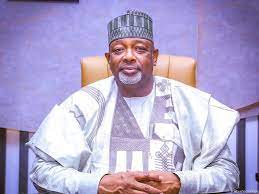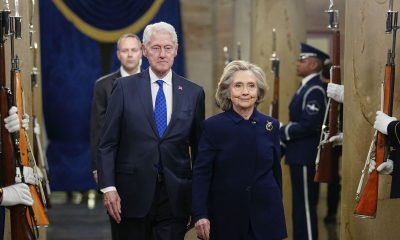General
Nigeria Suspends Food Import Duties, Partners with States to Boost Farming

In an effort to combat rising inflation and alleviate food shortages, the Federal Government of Nigeria has announced a 150-day duty-free import window for various food commodities. This measure, intended to stabilize food prices and ease the economic burden on Nigerians, will suspend duties, tariffs, and taxes on food imports through both land and sea borders.
Key Points:
- Duty-Free Import Window: Effective immediately, a five-month period has been established during which maize, husked brown rice, wheat, and cowpeas can be imported without incurring duties, tariffs, or taxes. These imports will be sold at a Recommended Retail Price to ensure affordability.
- Partnerships with States: The government will collaborate with state authorities and the military to identify and cultivate arable lands, providing substantial support to smallholder farmers. This initiative is part of the Presidential Accelerated Stabilisation and Advancement Plan, aimed at achieving food security and economic stability.
- Economic Context: In 2023, Nigeria spent $2.13 billion on food imports, despite having a robust agricultural sector. High food import bills have persisted due to challenges such as inadequate infrastructure, insecurity, and climate change. This new directive aims to reduce the demand for foreign exchange used by food importers.
- Government Support: To counteract the impact of rising prices and supply shortages, the government plans to import 250,000 metric tonnes each of wheat and maize in their semi-processed states, targeting small-scale processors and millers across the country.
- Impact on Local Agriculture: While this move is expected to mitigate immediate food inflation, experts warn it may weaken the domestic agricultural sector by making it difficult for local farmers to compete with imported goods. Sustainable agricultural policies and infrastructure improvements are crucial for long-term food security.
- Challenges and Recommendations: Persistent issues such as poor transportation infrastructure, market access, and security continue to affect food production and distribution. Experts suggest declaring a state of emergency in the food sector and implementing comprehensive measures to boost local production and self-sufficiency.
Minister of Agriculture Abubakar Kyari emphasized the importance of these measures in bringing relief to Nigerians and supporting the agricultural sector through enhanced land cultivation and sustained farmer support. However, he acknowledged the need for long-term solutions to ensure food security beyond the temporary tariff suspension.
As Nigeria navigates this critical period, the government’s proactive stance on food imports and agricultural collaboration will be closely monitored to assess its effectiveness in stabilizing the nation’s food economy and alleviating the hardships faced by its citizens.
General
Trump threatens Canada with 100% tariffs over China trade deal

US President Donald Trump has warned that Canada could face sweeping trade penalties if it deepens its commercial ties with China, signalling a fresh phase in North American trade tensions even as global economic relationships continue to evolve.
In a message posted on his Truth Social platform on Saturday, Trump said the United States would impose a 100% tariff on all Canadian goods entering the country should Ottawa proceed with a trade agreement with Beijing. “If Canada makes a deal with China, it will immediately be hit with a 100% Tariff against all Canadian goods and products coming into the U.S.A.,” he wrote.
The warning comes amid increasingly strained relations between Trump and Canadian Prime Minister Mark Carney. Tensions have intensified following Carney’s recent speech at the World Economic Forum in Davos, Switzerland, where he called for smaller and mid-sized nations to assert themselves amid shifting global power structures. His remarks were widely interpreted as a pushback against the dominance of major powers in shaping the world economic order.
Carney has also held high-level talks with Chinese President Xi Jinping, after which Canada announced it had reached a trade agreement with China. The deal reportedly includes cooperation on electric vehicles, a sector seen as central to the future of global manufacturing and the green energy transition.
Responding to those developments, Trump again referred to the Canadian leader as “Governor Carney” and accused Canada of attempting to serve as a conduit for Chinese exports into the US market. He wrote that if Carney “thinks he is going to make Canada a ‘Drop Off Port’ for China to send goods and products into the United States, he is sorely mistaken.”
While Trump did not outline a specific timeline or provide further details on how the proposed tariffs would be implemented, his remarks echoed earlier rhetoric. Last year, during a previous dispute, Trump repeatedly described Canada as America’s “51st state,” labelled its leader a “governor,” and even suggested the US might seek to acquire the country outright — comments that drew strong reactions north of the border.
Despite these sharp exchanges, relations between Washington and Ottawa had shown signs of stabilising in recent months. However, Trump’s renewed focus on territorial ambitions regarding Greenland and his critical comments about Nato have again placed him at odds with both Canadian and European leaders.
In Davos this week, Carney stopped short of naming Trump directly but cautioned that the US-led global order was at risk of a “rupture,” language that appeared to provoke a forceful response from the US president. Speaking after Carney, Trump asserted the depth of economic ties between the two neighbours, saying, “Canada lives because of the United States.”
General
Why Businesses in Cypress, TX Are Turning to Abii & Associates for Legal Guidance

As the commercial landscape in Cypress, Texas continues to expand, more local businesses are recognizing the importance of having legal protection built into their operations. From startup founders to seasoned entrepreneurs, one law firm is quickly becoming the go-to resource for business legal services: Abii & Associates.
With a growing number of small and mid-sized businesses calling Cypress home, the need for reliable, strategic legal counsel has never been greater. Abii & Associates has stepped in to fill that gap, offering tailored legal solutions for companies navigating formation, contracts, compliance, and growth challenges.
Legal Clarity for Local Business Owners
Running a successful business in Cypress, TX requires more than just a good idea. Business owners must consider how to structure their companies, protect their intellectual property, negotiate contracts, and comply with state and federal laws.
Abii & Associates provides a full range of business and corporate legal services, including:
- LLC and corporation formation
- Contract drafting and review
- Employment policies and advisory
- Commercial lease and vendor agreements
- Partnership and shareholder disputes
- Business purchases and sales
- Regulatory compliance and liability protection
“Businesses in Cypress, TX deserve legal support that’s both strategic and personal,” said a spokesperson for the firm. “We help clients make smart decisions today to avoid expensive problems tomorrow.”
Trusted by the Cypress Business Community
What sets Abii & Associates apart is their hands-on, responsive approach. Business owners report that the firm offers legal advice that’s easy to understand—and even easier to implement.
One local entrepreneur shared,
“They took the time to understand my business, not just my legal question. The advice was spot-on, and it gave me confidence moving forward.”
Abii & Associates doesn’t rely on cookie-cutter templates or generic solutions. Instead, they craft legal strategies that align with the unique structure, size, and goals of each business they serve.
Supporting Growth in Cypress, TX
Cypress continues to attract new residents and businesses, making it a key hub for economic development in the Houston metro area. Abii & Associates’ decision to expand services in the area is already making a difference for local companies looking to protect and grow their enterprises.
“We’re committed to helping businesses in Cypress, TX build on a strong legal foundation,” the firm adds. “When your legal framework is solid, your business is freer to thrive.”
To learn more about Abii & Associates’ services for Cypress business owners, visit:
👉 https://www.abiilegal.com/practice-area/business-and-corporate-lawyer-serving-cypress-texas
General
Pearland Law Firm Abii & Associates Helps Residents Navigate the Complexities of Bankruptcy

As rising debt and financial strain affect households and small businesses across Texas, one Pearland-based law firm is stepping up to offer clarity and legal relief. Abii & Associates, a multi-practice legal firm located in Pearland, has become a trusted resource for residents considering bankruptcy as a path toward financial recovery.
With a steady increase in inquiries related to debt relief, attorneys at Abii & Associates report that many Texans remain unsure about their rights, protections, and legal options when facing overwhelming financial pressure. According to the firm, bankruptcy is often misunderstood—but in the right situations, it can offer powerful protection and a fresh start.
“People often delay seeking help because of fear or stigma,” one of the attorneys at Abii & Associates shared. “But the reality is that bankruptcy, when handled properly, is a legal tool designed to help—not punish—those who are financially distressed.”
The firm regularly handles both Chapter 7 and Chapter 13 filings, providing clients with tailored guidance based on their unique financial picture. Under Chapter 7, qualified individuals may be able to discharge unsecured debts entirely, while Chapter 13 allows those with regular income to reorganize their payments and keep important assets like homes and vehicles.

One of the key advantages for local clients is that Texas law provides some of the most generous bankruptcy exemptions in the country, allowing individuals to retain more of their property than they might expect. Attorneys at Abii & Associates say many clients are surprised to learn they can file for bankruptcy and still protect their home, car, and retirement accounts.
“Every case is different, and that’s why personalized counsel is so important,” the firm explains. “We don’t offer one-size-fits-all advice. We sit down with our clients, evaluate their assets and goals, and walk them through every step of the process.”
In addition to consumer bankruptcy, the firm also advises small business owners dealing with insolvency, commercial debt, or pending lawsuits. Their goal, they say, is not only to offer legal solutions—but to preserve dignity and protect futures.
The bankruptcy team at Abii & Associates is currently accepting consultations for individuals, families, and businesses in Pearland and throughout the Houston metro area. The firm encourages anyone facing creditor harassment, foreclosure, or overwhelming debt to explore their legal options early—before the situation becomes harder to manage.
To learn more about bankruptcy services at Abii & Associates or to schedule a consultation, visit:
👉 https://www.abiilegal.com/law-firm-in-pearland-texas/bankruptcy
-

 News1 week ago
News1 week agoAndrew and Epstein asked exotic dancer for ‘sex acts,’ legal letter claims
-

 Business1 week ago
Business1 week agoChina bans hidden car door handles over safety concerns
-

 News1 week ago
News1 week agoClintons Agree to Testify in Epstein Probe as Congress Pauses Contempt Push
-

 News4 days ago
News4 days agoRussia Identifies Suspects in Shooting of Senior General
-

 News4 days ago
News4 days agoIranian Nobel Laureate Faces New Sentence as Support and Global Scrutiny Intensify
-

 News3 days ago
News3 days agoStarmer Vows to Stand Firm as He Rallies MPs Amid Mounting Political Pressure
-

 News1 week ago
News1 week agoLife Sentence Brings Closure After 2024 Attempt on Trump’s Life
-

 News2 days ago
News2 days agoNine killed and 25 injured in shootings at school and home in Canada









